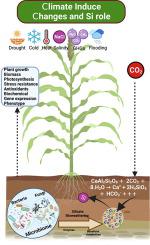当前位置:
X-MOL 学术
›
J. Adv. Res.
›
论文详情
Our official English website, www.x-mol.net, welcomes your feedback! (Note: you will need to create a separate account there.)
Silicon: A valuable soil element for improving plant growth and CO2 sequestration
Journal of Advanced Research ( IF 11.4 ) Pub Date : 2024-05-26 , DOI: 10.1016/j.jare.2024.05.027 Abdul Latif Khan 1
Journal of Advanced Research ( IF 11.4 ) Pub Date : 2024-05-26 , DOI: 10.1016/j.jare.2024.05.027 Abdul Latif Khan 1
Affiliation

|
Silicon (Si), the second most abundant and quasi-essential soil element, is locked as a recalcitrant silicate mineral in the Earth’s crust. The physical abundance of silicates can play an essential role in increasing plant productivity. Plants store Si as biogenic silica (phytoliths), which is mobilized through a chemical weathering process in the soil. Although Si is a critical element for plant growth, there is still a considerable need to understand its dissolution, uptake, and translocation in agroecosystems. Here, we show recent progress in understanding the interactome of Si, CO, the microbiome, and soil chemistry, which can sustainably govern silicate dissolution and cycling in agriculture. Si cycling is directly related to carbon cycling, and the resulting climate stability can be enhanced by negative feedback between atmospheric CO and the silicate uptake process. Improved Si mobilization in the rhizosphere by the presence of reactive elements (for example, Ca, Na, Al, Zn, and Fe) and Si uptake through genetic transporters in plants are crucial to achieving the dual objectives of (i) enhancing crop productivity and (ii) abiotic stress tolerance. Furthermore, the microbiome is a symbiotic partner of plants. Bacterial and fungal microbiomes can solubilize silicate minerals through intriguingly complex bioweathering mechanisms by producing beneficial metabolites and enzymes. However, the interaction of Si with CO and the microbiome’s function in mobilization have been understudied. This review shows that enhancing our understanding of Si, CO, the microbiome, and soil chemistry can help in sustainable crop production during climatic stress events.
中文翻译:

硅:一种宝贵的土壤元素,可促进植物生长和二氧化碳封存
硅 (Si) 是第二丰富且准必需的土壤元素,作为顽固的硅酸盐矿物被锁定在地壳中。硅酸盐的物理丰度在提高植物生产力方面发挥着重要作用。植物将硅以生物硅(植硅体)的形式储存,通过土壤中的化学风化过程来移动。尽管硅是植物生长的关键元素,但仍然非常需要了解其在农业生态系统中的溶解、吸收和易位。在这里,我们展示了在理解硅、二氧化碳、微生物组和土壤化学相互作用方面的最新进展,这些相互作用可以可持续地控制农业中的硅酸盐溶解和循环。硅循环与碳循环直接相关,大气二氧化碳和硅酸盐吸收过程之间的负反馈可以增强由此产生的气候稳定性。通过反应元素(例如钙、钠、铝、锌和铁)的存在改善根际硅的动员以及通过植物遗传转运蛋白吸收硅对于实现(i)提高作物生产力和(ii) 非生物胁迫耐受性。此外,微生物组是植物的共生伙伴。细菌和真菌微生物组可以通过产生有益的代谢物和酶,通过有趣的复杂生物风化机制溶解硅酸盐矿物质。然而,Si 与 CO 的相互作用以及微生物组在动员中的功能尚未得到充分研究。本综述表明,增强我们对硅、二氧化碳、微生物组和土壤化学的了解有助于在气候胁迫事件期间实现可持续作物生产。
更新日期:2024-05-26
中文翻译:

硅:一种宝贵的土壤元素,可促进植物生长和二氧化碳封存
硅 (Si) 是第二丰富且准必需的土壤元素,作为顽固的硅酸盐矿物被锁定在地壳中。硅酸盐的物理丰度在提高植物生产力方面发挥着重要作用。植物将硅以生物硅(植硅体)的形式储存,通过土壤中的化学风化过程来移动。尽管硅是植物生长的关键元素,但仍然非常需要了解其在农业生态系统中的溶解、吸收和易位。在这里,我们展示了在理解硅、二氧化碳、微生物组和土壤化学相互作用方面的最新进展,这些相互作用可以可持续地控制农业中的硅酸盐溶解和循环。硅循环与碳循环直接相关,大气二氧化碳和硅酸盐吸收过程之间的负反馈可以增强由此产生的气候稳定性。通过反应元素(例如钙、钠、铝、锌和铁)的存在改善根际硅的动员以及通过植物遗传转运蛋白吸收硅对于实现(i)提高作物生产力和(ii) 非生物胁迫耐受性。此外,微生物组是植物的共生伙伴。细菌和真菌微生物组可以通过产生有益的代谢物和酶,通过有趣的复杂生物风化机制溶解硅酸盐矿物质。然而,Si 与 CO 的相互作用以及微生物组在动员中的功能尚未得到充分研究。本综述表明,增强我们对硅、二氧化碳、微生物组和土壤化学的了解有助于在气候胁迫事件期间实现可持续作物生产。
















































 京公网安备 11010802027423号
京公网安备 11010802027423号